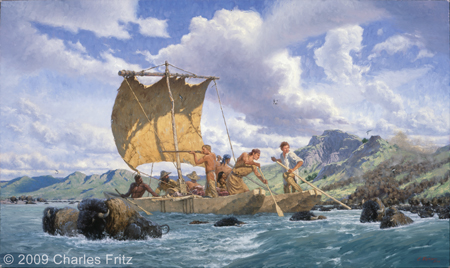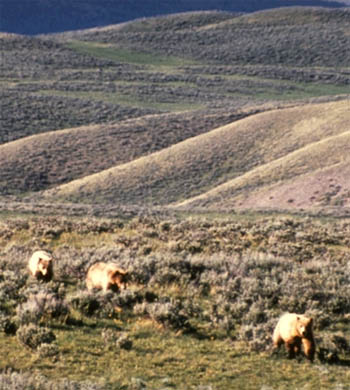Missouri and Yellowstone rivers, MT On the Yellowstone, Clark waits for a large herd of buffalo to cross. On the Missouri, Lewis passes the Musselshell River and stops to dry bighorn sheep skins. Pryor’s group paddles bull boats somewhere behind Clark. Everybody is slowed by the weather.
Captain Clark’s Exploration of the River Rochejhone in the Summer of 1806
30″ x 60″ oil on canvas
© 2009 by Charles Fritz. Used by permission.
Progress in the Rain[1]Originally aired weekdays by Yellowstone Public Radio during the Bicentennial observance of 2003-2006. Narrated by Hal Hansen. Scripts by Whit Hansen and Ed Jacobson. Produced by Leni Holliman. © … Continue reading
Clark Waits for Buffalo
Disagreeable Weather
We Set out early as usial the wind was high and ahead which caused the water to be a little rough and delayed us very much aded to this we had Showers of rain repeetedly all day at the intermition of only a fiew minits between them. My Situation a very disagreeable one. in an open Canoe wet and without a possibility of keeping my Self dry.
—William Clark
Buffalo Crossing
at 2 P. M. I was obliged to land to let the Buffalow Cross over. this gangue of Buffalow was entirely across and as thick as they could Swim. the Chanel on the Side of the island the went into the river was crouded with those animals for ½ an hour.
—William Clark
Four Fat Cows
I took 4 of the men and killed 4 fat Cows for their fat and what portion of their flesh the Small Canoes Could Carry that which we had killed a few days ago being nearly Spoiled from the wet weather.
—William Clark
Lewis Passes the Musselshell
Passing the Musselshell
The rain still continuing I set out early as usual and proceeded on at a good rate . . . . at 11 A. M. we passed the entrance of Mussel shell river. at 1 in the evening we arrived at a bottom on S. W. side where there were several spacious Indian lodges built of sticks and an excellent landing.
—Meriwether Lewis
Drying Skins
about 2 P. M. we halted at Some old Indn. Lodges on S. Side. here we delayd. this afternoon to dry our deer Skins Mountn. Sheep [bighorn sheep] Skins &. C. which were near Spoiling as the weather has been Some time wet.
—Meriwether Lewis
Poor Grizzly Season
this speceis of bar are rearly as poor at this season of the year as the common black bear nor are they ever as fat as the black bear is found in winter; as they feed principally on flesh, like the wolf, they are most fatt when they can procure a sufficiency of food without rispect to the season of the year. the oil of this bear is much harder than that of the black bear being nearly as much so as the lard of a hog. the flesh is by no means as agreeable as that of the black bear, or Yahkah or partycoloured bear
—Meriwether Lewis
Pryor’s High-Capacity Boats
one of those Canoes will carry 6 or 8 Men and their loads. Those two Canoes are nearly the Same size 7 feet 3 inches diamieter & 16 inchs deep 15 ribs or Cross Sticks in each.
—William Clark (recorded 8 August 1806)[2]Precise dates and locations for Pryor’s trip down the Yellowstone are not known. Pryor was instructed to keep a journal, but it if he did, it is lost.
Weather Diaries
State of the weather at rise
Wind at rise
State of the weather at 4 P. M. Wind at 4 P. M. rain after rain N E rain after rain N W —Meriwether Lewis
Notes
| ↑1 | Originally aired weekdays by Yellowstone Public Radio during the Bicentennial observance of 2003-2006. Narrated by Hal Hansen. Scripts by Whit Hansen and Ed Jacobson. Produced by Leni Holliman. © 2003 by Yellowstone Public Radio. |
|---|---|
| ↑2 | Precise dates and locations for Pryor’s trip down the Yellowstone are not known. Pryor was instructed to keep a journal, but it if he did, it is lost. |


